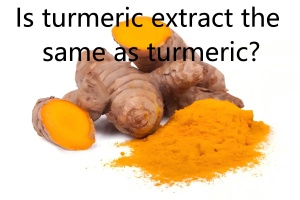Is turmeric extract the same as turmeric?

Turmeric extract and turmeric spice both come from the vibrant yellow root of the Curcuma longa plant, but they’re not the same. Turmeric spice, the familiar powder in your kitchen, contains about 2–9% curcumin, the compound responsible for its health benefits, like fighting inflammation and boosting antioxidants. Turmeric extract, however, is a concentrated form, often standardized to contain 95% curcuminoids, making it far more potent. This means a small dose of extract delivers a much stronger effect than a spoonful of turmeric spice, which is better suited for culinary use than targeted health support.
The production process sets these two apart. Turmeric spice is simply dried and ground turmeric root, retaining its natural mix of oils, fibers, and a small amount of curcumin. Turmeric extract, on the other hand, undergoes a refining process to isolate curcuminoids, often combined with piperine from black pepper to boost absorption by up to 2,000%. This makes extracts ideal for supplements aimed at specific health goals, like reducing joint pain or supporting liver health, as studies show curcumin’s benefits are most effective at higher concentrations. For example, a 2016 study in Phytotherapy Research found 500 mg of curcumin extract daily reduced arthritis symptoms significantly more than turmeric spice alone.
Choosing between turmeric extract and turmeric depends on your needs. If you’re cooking a curry or adding flavor to dishes, turmeric spice is perfect, offering mild health benefits alongside its culinary charm. For targeted wellness, like easing inflammation or supporting heart health, turmeric extract’s high curcumin content makes it the better choice, especially in supplement form. However, extracts should be used carefully—consult a doctor if you’re on medications like blood thinners, as curcumin can interact. Both forms have their place, but their differences in potency and purpose make them distinct tools for health and flavor.
